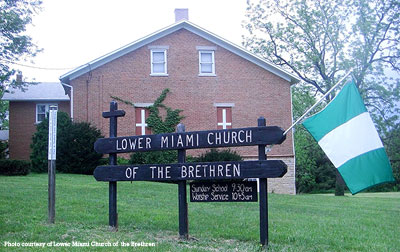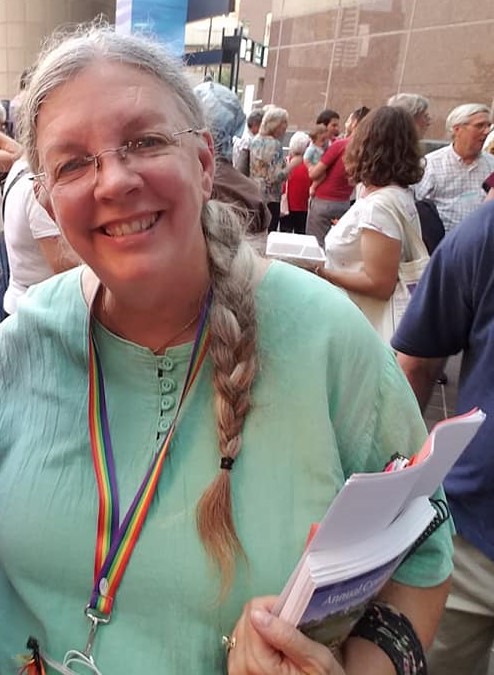
Luke 14: 1, 7-14
(dressed shabbily and barefoot coming from the back of the sanctuary during monologue)
I’m on my way to a banquet. I think it’s at the end of this street.
I’ve never been to a banquet before—I hear there’s lots of food. I can’t imagine. My friend told me I was invited, but I can hardly believe it. I’m poor—I don’t get invited to banquets. They’re for the rich people. I mean, look at me—I don’t have nice clothes—I don’t even have sandals.
Look—there are some others going in. Ooh, they are dressed so nice. They must be rich. Oh, I don’t know about this. Do you suppose it’s a mistake that I was invited? Maybe I’ll just sit here and see what happens (sit on side of the step to chancel).
Look, here come some more people. Look how they rush right past me—like I’m not even here. It’s always been that way, you know—we poor just don’t matter. Oh, I’m truly hungry, and it smells so good in there.
What? Are you talking to me? I am invited? Are you sure? Oh, thank you. (stand, go up steps, look around in awe, pause, slowly put head down)
Have you ever been excluded from a banquet or other event? How did it feel? Let’s face it—it doesn’t feel good to be left out. It hurts. Lots of stories and movies we grow up on are about being excluded, being left out. Cinderella comes to mind—surely we remember the mean stepmother and the stepsisters, Anastasia, and Drizella. They made it so clear that Cinderella simply didn’t belong and could not possibly go to the ball. (in a mean stepsister voice) “Oh, Cinderella, how could you go to the ball—you don’t have a dress and besides, you wouldn’t know how to act.”
Think of these movies—“West Side Story.” Tony the all-American boy falls in love with Maria, a Puerto Rican immigrant. Neither would be accepted, or even welcome, in the other one’s family or culture. What about the movie “Philadelphia” starring Tom Hanks as an up and coming lawyer who gets fired when his firm finds out he is gay and has AIDS? He was quite abruptly excluded. Then there’s “Remember the Titans” about a southern town’s first African-American high school football coach, who was threatened and harassed, definitely not made to feel welcome.
Our text today is all about who is welcome at the banquet. In the first century Mediterranean area, Jewish and Greco-Roman societies both shut out the poor and disabled. For them, food was security, power, and prestige. There was not much of a middle class. You either had land, food, and power, or you did not, and you worked for the people who did. Oh, you might have a small plot of land, but the taxes would eat you alive. Many folks rented a plot of land, and it was not uncommon to have to borrow money just to buy seeds to plant. If you did not have any land, you were most likely a day laborer, hoping for any work and food you could get. If you couldn’t pay your debts, your family might be sold into slavery. If you were disabled and could not work at all, about the only choice you had was to beg. Those with land and food wanted nothing to do with those they considered below themselves—the riff-raff, the unclean. In addition to this economic hierarchy, there was the honor/shame system. Nothing was as important as your family’s honor.
Enter Jesus, who challenged the entire system every step of the way. Why do you suppose he was even invited to this Sabbath banquet given by a Pharisee? Jesus had a reputation for keeping company with the poor and the unclean. However, he was gaining notoriety and popularity. Was he a celebrity, being invited to the important social events? Verse 1 says he was being “watched.” Why was he being watched? (wait for answers) Have you ever heard the phrase, “Keep your friends close, but keep your enemies closer?” Yes, the Pharisees were hoping to catch him doing something not allowed, like maybe healing on the Sabbath. What does Jesus do as soon as he gets to the banquet? Look at verses 2-6. Yes, he heals a man with dropsy. Now, I ask you, in a society where the poor and unclean were certainly NOT invited to a banquet, why was that man there? I sure think it looks like a set-up to catch Jesus and get him in trouble.

Now, given the situation, you might think Jesus would lay low, behave himself, fly below the radar, right? But no, after watching how the guests jockeyed for good and prestigious seating, he lectures them, telling them, “When you’re invited to a banquet, don’t presume to sit in a place of honor. Someone more distinguished than you might come along and your host will have to ask you to move. You will be disgraced. No, go and sit at the lowest place, then let your host tell you to move up to a more distinguished spot. That will bring you honor.” Well, I bet that ruffled a few feathers. Who was this backwater guy from Nazareth to tell the uppity-ups what to do?
But Jesus wasn’t finished. He then turns his attention to the host—“When you host a party, don’t invite your friends, relatives, and rich neighbors, knowing they will be obliged to invite you to their next party. No–invite the poor, the crippled, the lame and the blind, those who could never repay you. Then you will be blessed.” Jesus totally undercuts the social hierarchy in place, and goes after the sin of pride. He lectures the guests and the host about humility. He is pointing out that justice is a measure of the health of a society–taking care of the poor and the outcast is an indication of how well a society is doing. Alcoholics Anonymous says this about humility—humility is not thinking less of yourself. It is thinking of yourself less. Again, humility is not thinking less of yourself; it is thinking of yourself less. What does Jesus say in verse 11? “For all who exalt themselves will be humbled, and those who humble themselves will be exalted.” And the last shall be first.
In God’s eyes, we are all equally needy. There’s no hierarchy. Whether it’s Mother Teresa, Billy Graham, you, or me–we come before God as equals—as sinners in need of salvation. The message of Jesus is that God invites and welcomes each and every one of us to the banquet. Mind you, we don’t deserve to be invited, but God invites us and calls us. Once called by God and redeemed by God’s saving grace, the message is clear. We must do likewise and invite and welcome others. We, too, must be willing to include the outsider just as we have been included.
Jesus encouraged the disciples to go beyond giving food to strangers. He encouraged them to sit down and share a meal with the stranger. That reminded me of the annual Beerman Foundation Thanksgiving Dinner held each year at the Convention Center. Have any of you ever been to the dinner? It’s wonderful. Our family volunteered at the dinner for ten years, and it’s a fond memory for all of us. I especially remember the first year. It was quite cold and snowy outside. As close to 6,000 people kept streaming through the doors into the festive dining area, the decorated tables and wonderful aroma of turkey and dressing welcomed everyone. You could tell who was homeless. Their beards were frozen, their noses were red, they were ragged. On the street, they might have been ignored and passed by. But not at the Beerman dinner; here they were warmly welcomed and fed. I was a greeter, showing people to the food lines. These folks, who many would consider outcasts, would shake my hand and return my greeting with “Happy Thanksgiving to you, too.” They were so social and pleasant; they blessed me. We were all equal that day. There was a homeless man at one table and two ladies dressed to the hilt with mink stoles on at the next table. The Beerman dinner is not just for the poor. It is for anyone who wants to come. Everyone is invited.
How inviting are we? We acknowledge that we do not deserve to be invited to God’s table, and we acknowledge we are eternally grateful that God invites us to the banquet. But what do we do beyond that? Is it enough to donate items to the homeless once a year or food to the food pantry? Are we really inviting people to the banquet when we keep our distance from those who are poor or homeless? Jesus ate with the outcasts; do we? He spent time with thieves and liars and the least of these. Do we?
It is hard for us to realize that we may be excluding people. We like to think we are enlightened and open; but who might we exclude if they showed up at our church door? A homeless person? A gay person? A Hispanic who was hard to understand? The local prostitute? A mentally ill person? A white supremacist? A young couple covered with tattoos? When I think about it, I wonder if we don’t each have a reason to be excluded. My husband David could be excluded because his brother was an alcoholic. I could be excluded because I have a sister who is mentally retarded.
Do we live as an inviting people?
Do we speak inviting words?
Do we have inviting attitudes?
Do we lead lives that invite people to Christ, especially those who are the least of these?
Do we invite them in as God has invited us in so they, too, may receive what we have received?
I pray we have the courage to live as inviting people.
Come to the banquet. Invite others. Amen.

Nan Erbaugh is the pastor of Lower Miami CoB in Dayton, OH, an integrated and open and affirming faith community committed to peace and justice

